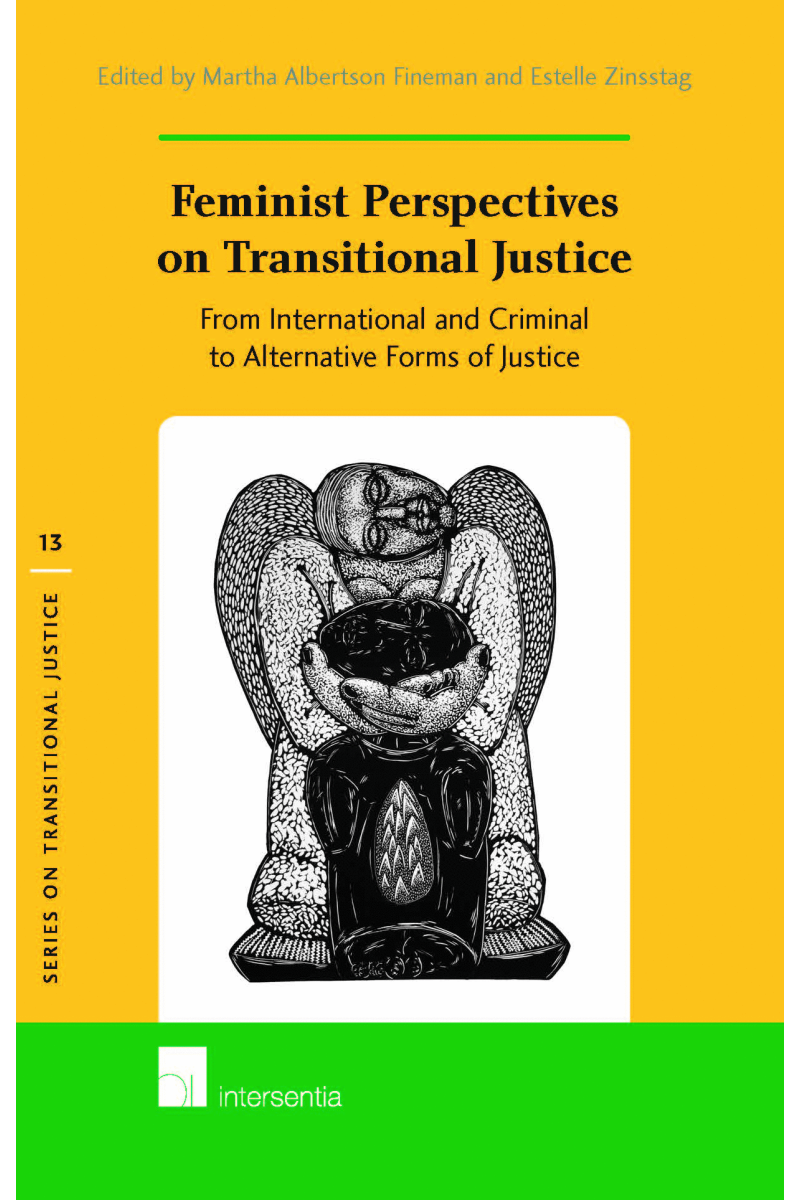 maestro
mastercard
visa
maestro
mastercard
visa

Feminist Perspectives on Transitional Justice
From International and Criminal to Alternative Forms of Justice

Truth-seeking mechanisms, international criminal law developments, and other forms of transitional justice have become ubiquitous in societies emerging from long years of conflict, instability and oppression and moving into a post-conflict, more peaceful era.
In practice, both top-down and bottom-up approaches to transitional justice are being formally and informally developed in places such as South Africa, Liberia, Peru, Chile, the Democratic Republic of Congo, Sierra Leone, Rwanda, the former Yugoslavia, and Northern Ireland. Many studies, conferences and debates have taken place addressing these developments and providing elaboration of theories relating to transition justice generally.
However, rarely have these processes been examined and critiqued through a feminist lens. The position of women, particularly their specific victimisation, typically has not been taken into account in any systematic manner. Seldom do commentators specifically consider whether the recently developed mechanisms for promoting peace and reconciliation will actually help the position of women in a society moving out of repression or conflict. This is unfortunate, since women’s issues are often overlooked and post-conflict societies, because they must rebuild, are ideally poised to introduce standards that would enable and ensure the active participation of the entire population, including women, in rebuilding a more stable, fair and democratic polity.
This book offers some insights into women’s perspectives and feminist views on the topic of transitional justice or ‘justice in transition’. Bringing feminism into the conversation allows us to expand the possibilities for a transformative justice approach after a period of conflict or insecurity, not by replacing it with feminist theory, but by broadening the scope and vision of the potential responses.
About this book
‘This book is essential for those whose main lines of research are transitional justice, gender, feminism and conflict resolution because it collects together different -perspectives on feminism and the transition to post-conflict times. We have the opportunity to deepen the connection between transitional justice and feminism, but also to reflect on the challenges that lie ahead. In this respect, some of the chapters offer interesting methodologies through which previous findings may be seen in a new light. Everything makes more sense when theory and practice are linked, something that this book does extremely well. The cases of Chile, Kyrgyzstan, Bosnia, Cuba, South Africa, the United States, and others enrich the analysis and help to re-define new strategies to ensure that the gender perspective is kept firmly in the forefront of transitional justice.’
Carolina Jimenez Sanchez in Revue Québécoise de droit international (2013) 291
‘[Feminist Perspectives on Transitional Justice] opens up fruitful avenues for further research.’
Rosemary Nagy in Canadian Journal of Women and the Law (2014) 446
‘[W]ith this collection of essays Fineman and Zinsstag have succeeded in exposing transitional justice methodologies to the scrutiny of feminism. This book is essential reading for those involved in developing or implementing transitional justice mechanisms, as it raises the critical discussions that must not be ignored if transitional justice is to positively impact the lives of women in transitioning societies.’
Grace A. Harbour in Journal of International Criminal Justice (2015)
Introduction
| Type of product | Book |
|---|---|
| Format | Hardback |
| EAN / ISSN | 9781780681429 / 9781839700682 |
| Series name | Series on Transitional Justice |
| Weight | 763 g |
| Status | Available |
| Number of pages | xvi + 362 p. |
| Access to exercice | No |
| Publisher | Intersentia |
| Language | English |
| Publication Date | May 2, 2013 |
| Available on Strada Belgique | No |
| Available on Strada Europe | No |
| Available on Strada Luxembourg | No |
Downloads
- Table of Contents
- Introduction: Feminist Perspectives on Transitional Justice
Martha Albertson Fineman - PART 1. FEMINIST PERSPECTIVES IN CONTEXTS
- Chapter 1. International Law and Domestic Gender Justice, or Why Case Studies Matter
Catherine O'Rourke - Chapter 2. Advancing a Feminist Analysis of Transitional Justice
Fionnula Ni Aolain - Chapter 3. Feminist Perspectives on Extraordinary Justice
David C. Gray, Benjamin A. Levin - Chapter 4. Intersectionality: A Feminist Theory for Transitional Justice
Eilish Rooney - PART 2. FEMINIST LEGAL STRATEGIES AND THEIR CONSEQUENCES
- Chapter 5. International Law, Crisis and Feminist Time
Mary H. Hansel - Chapter 6. Justice as Practised by Victims of Conflict: Post-World War II Movements as Sites of Engagement and Knowledge
Cheah Wui Ling - Chapter 7. The Symbolic and Communicative Function of International Criminal Tribunals
Teresa Godwin Phelps - PART 3. EMERGING ALTERNATIVES WITHIN TRANSITIONAL JUSTICE
- Chapter 8. Sexual Violence Against Women in Armed Confl icts and Restorative Justice: An Exploratory Analysis
Estelle Zinsstag - Chapter 9. Greensboro and Beyond: Remediating the Structural Sexism in Truth and Reconciliation Processes and Determining the Potential Impact and Benefits of Truth Processes in the United States
Peggy Maisel - Chapter 10. Exclusion of Women in Post-Conflict Peace Processes: Transitional Justice in Northern Uganda
Joseph Wasonga - Chapter 11. Shifting Paradigms for State Intervention: Gender-Based Violence in Cuba
Deborah M. Weissman - PART 4. CASE STUDIES
- Chapter 12. Beauty and the Beast: Gender Integration and the Police in Post-Conflict Bosnia and Herzegovina
Lisa Muftic, Azra Rasic - Chapter 13. The Parallel Processes of Law and Social Change: Gender Violence and Work in the United States and South Africa
Julie Goldscheid - Chapter 14. Neoliberalism’s Impact on Women: A Case Study in Creating Supply and Demand for Human Trafficking
Dina Haynes - About the Authors